人教版(2019) 必修第一册 Unit 5 Languages Around the World 定语从句关系副词课件(17张PPT)
文档属性
| 名称 | 人教版(2019) 必修第一册 Unit 5 Languages Around the World 定语从句关系副词课件(17张PPT) | 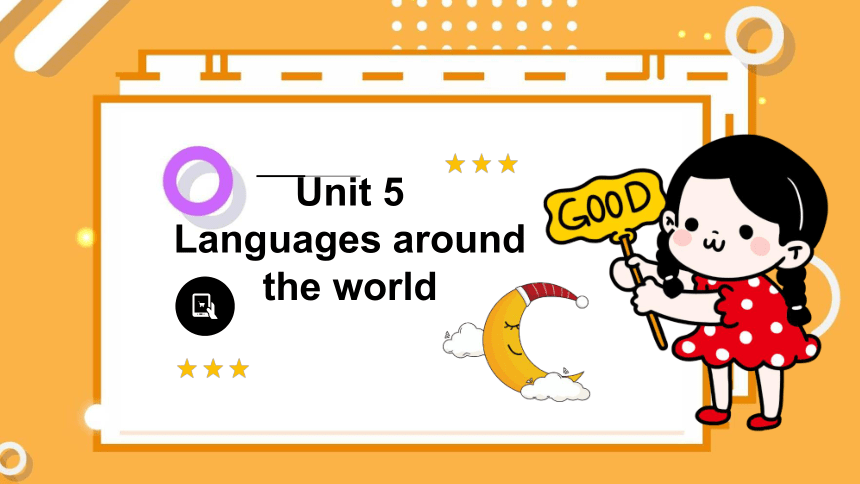 | |
| 格式 | pptx | ||
| 文件大小 | 880.9KB | ||
| 资源类型 | 教案 | ||
| 版本资源 | 人教版(2019) | ||
| 科目 | 英语 | ||
| 更新时间 | 2022-12-04 11:29:45 | ||
图片预览

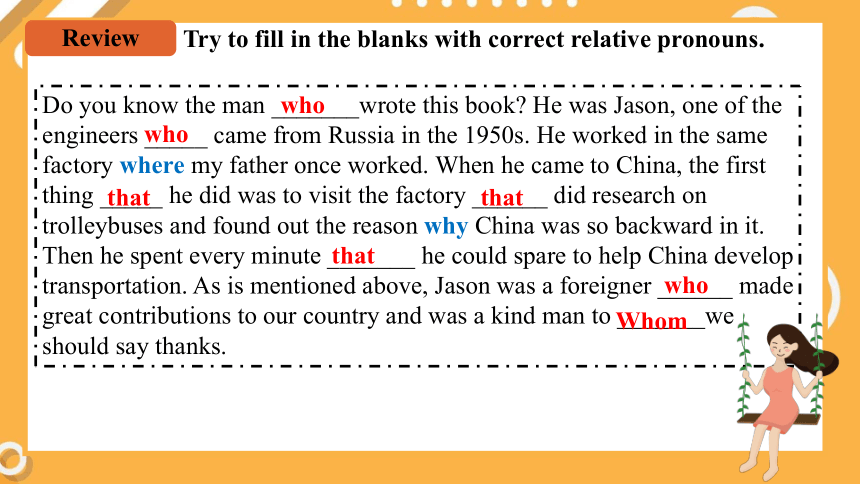
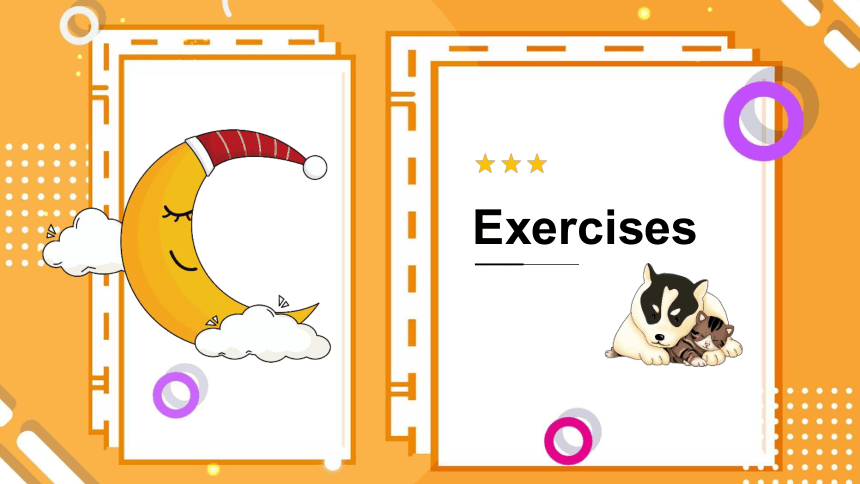
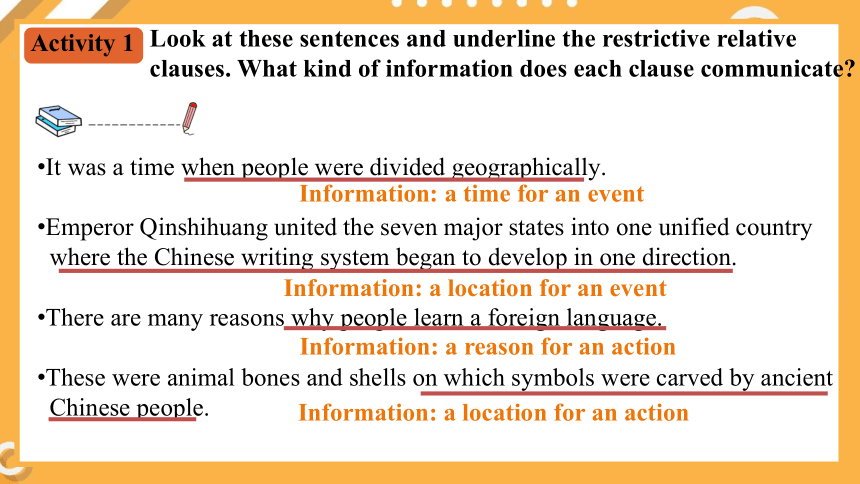
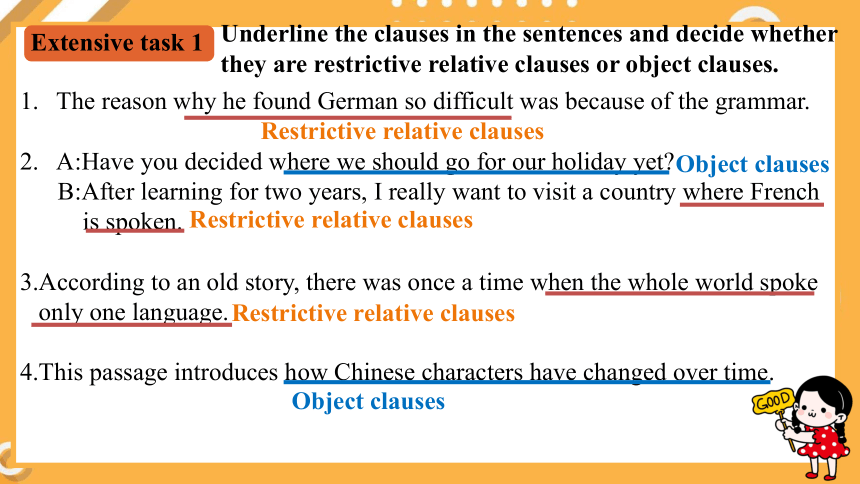
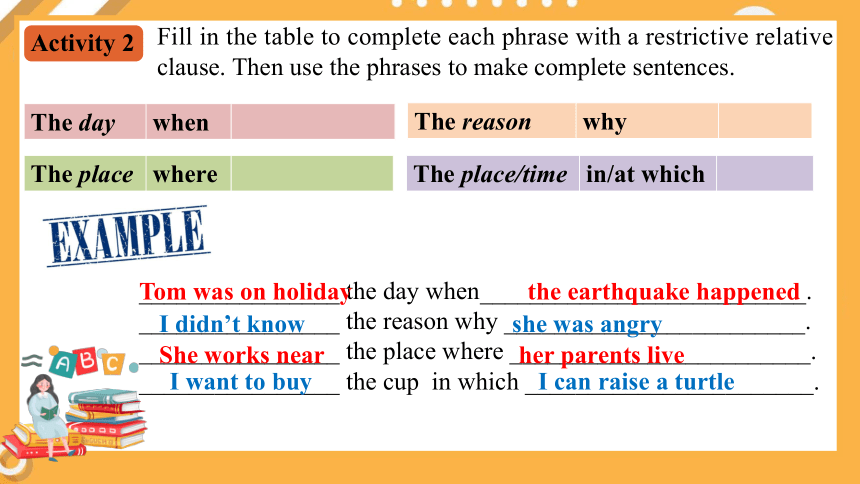
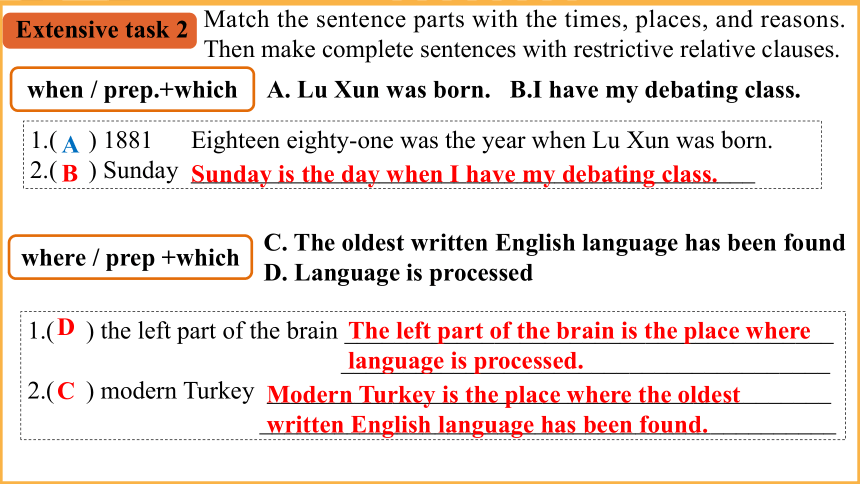
文档简介
(共17张PPT)
Unit 5
Languages around the world
as
Review
01
Do you know the man _______wrote this book He was Jason, one of the engineers _____ came from Russia in the 1950s. He worked in the same factory where my father once worked. When he came to China, the first thing _____ he did was to visit the factory ______ did research on trolleybuses and found out the reason why China was so backward in it. Then he spent every minute _______ he could spare to help China develop transportation. As is mentioned above, Jason was a foreigner ______ made great contributions to our country and was a kind man to _______we should say thanks.
Try to fill in the blanks with correct relative pronouns.
who
who
that
that
that
who
Whom
Exercises
Activity 1
Look at these sentences and underline the restrictive relative clauses. What kind of information does each clause communicate
It was a time when people were divided geographically.
Emperor Qinshihuang united the seven major states into one unified country
where the Chinese writing system began to develop in one direction.
There are many reasons why people learn a foreign language.
These were animal bones and shells on which symbols were carved by ancient
Chinese people.
Information: a time for an event
Information: a location for an event
Information: a reason for an action
Information: a location for an action
Extensive task 1
The reason why he found German so difficult was because of the grammar.
A:Have you decided where we should go for our holiday yet
B:After learning for two years, I really want to visit a country where French
is spoken.
3.According to an old story, there was once a time when the whole world spoke
only one language.
4.This passage introduces how Chinese characters have changed over time.
Underline the clauses in the sentences and decide whether they are restrictive relative clauses or object clauses.
Restrictive relative clauses
Object clauses
Restrictive relative clauses
Restrictive relative clauses
Object clauses
Activity 2
The day when
The reason why
The place where
The place/time in/at which
Fill in the table to complete each phrase with a restrictive relative clause. Then use the phrases to make complete sentences.
________________ the day when__________________________.
________________ the reason why ________________________.
________________ the place where ________________________.
________________ the cup in which _______________________.
Tom was on holiday the earthquake happened
I didn’t know she was angry
She works near her parents live
I want to buy I can raise a turtle
Extensive task 2
Match the sentence parts with the times, places, and reasons. Then make complete sentences with restrictive relative clauses.
when / prep.+which
A. Lu Xun was born. B.I have my debating class.
1.( ) 1881 Eighteen eighty-one was the year when Lu Xun was born.
2.( ) Sunday _____________________________________________
Sunday is the day when I have my debating class.
A
B
where / prep +which
C. The oldest written English language has been found
D. Language is processed
1.( ) the left part of the brain _______________________________________
_______________________________________
2.( ) modern Turkey _____________________________________________
______________________________________________
D
C
The left part of the brain is the place where language is processed.
Modern Turkey is the place where the oldest written English language has been found.
Activity 3
Complete the passage with the correct relative adverbs or pronouns. Add a preposition where necessary.
where/in which
when/on which
where/at which
which/that
why
Structure
Summary
where, when, why引导的从句
关系副词 例 句
when在从句中作时间状语 I'll never forget the time when (= during which) we visited Xi'an.
Do you remember the day when (= on which) we first met
where在从句中作地点状语 This is the place where (= at/in which) we first met.
The hotel where (= at/in which) we stayed was very clean.
why在从句中作原因状语 That's the reason why (= for which) he missed his bus.
I didn't get a pay rise, but this wasn't the reason why (= for which) I left.
Exercises
The place _________ interested my most was the Children’s Palace.
This is the hotel _______ they stayed last month.
Do you know the year _______ the Chinese Communist Party was founded
That is the day ________ I’ll never forget.
The factory _____________ we’ll visit next week is not far from here.
Great changes have taken place since then in the factory _______ we are working.
Can you lend me the book _____ ______ you talked yesterday
The pen _____ _____ he is writing is mine.
Is there anyone in your class _______ family is in the country
I’m interested in all ______ you have said.
that/which
where
when
that/which
that/which
where
about which
with which
whose
that
Exercises
Fill in the blanks with the correct relative pronouns or adverbs. Add a preposition where necessary.
Japanese uses three writing systems, including kanji __________
originated(起源) in China.
Nineteen fifty-three was the year ______________ Xinhua Zidian, or the New Chinese Dictionary, first came out.
Bones _______________ symbols were carved, known as "oracle
bones", have contributed a lot to our understanding of China's past.
There are many reasons __________ English is so widely used around
the world in the fields of science, business, and more.
Sign language is of great importance for people __________ are deaf
or have poor hearing.
that/which
when/in which
where/on which
why
who
Key words
1. specific adj. 特定的;明确的;具体的
to be specific
specific to
specific experience
具体来说;具体的说
特定于;针对
具体经历;具体履历
Key words
2. struggle n.&vi. 斗争;奋斗;搏斗
struggle for
struggle with/against sb/sth
struggle to do sth
struggle to one’s feet
为…而斗争
与…做斗争
努力做某事
挣扎着站起来
Key words
3. point of view 观点;看法
in view of
view on
in my view
鉴于;考虑到
在…的观点
在我看来;我认为
THANK YOU
as
Unit 5
Languages around the world
as
Review
01
Do you know the man _______wrote this book He was Jason, one of the engineers _____ came from Russia in the 1950s. He worked in the same factory where my father once worked. When he came to China, the first thing _____ he did was to visit the factory ______ did research on trolleybuses and found out the reason why China was so backward in it. Then he spent every minute _______ he could spare to help China develop transportation. As is mentioned above, Jason was a foreigner ______ made great contributions to our country and was a kind man to _______we should say thanks.
Try to fill in the blanks with correct relative pronouns.
who
who
that
that
that
who
Whom
Exercises
Activity 1
Look at these sentences and underline the restrictive relative clauses. What kind of information does each clause communicate
It was a time when people were divided geographically.
Emperor Qinshihuang united the seven major states into one unified country
where the Chinese writing system began to develop in one direction.
There are many reasons why people learn a foreign language.
These were animal bones and shells on which symbols were carved by ancient
Chinese people.
Information: a time for an event
Information: a location for an event
Information: a reason for an action
Information: a location for an action
Extensive task 1
The reason why he found German so difficult was because of the grammar.
A:Have you decided where we should go for our holiday yet
B:After learning for two years, I really want to visit a country where French
is spoken.
3.According to an old story, there was once a time when the whole world spoke
only one language.
4.This passage introduces how Chinese characters have changed over time.
Underline the clauses in the sentences and decide whether they are restrictive relative clauses or object clauses.
Restrictive relative clauses
Object clauses
Restrictive relative clauses
Restrictive relative clauses
Object clauses
Activity 2
The day when
The reason why
The place where
The place/time in/at which
Fill in the table to complete each phrase with a restrictive relative clause. Then use the phrases to make complete sentences.
________________ the day when__________________________.
________________ the reason why ________________________.
________________ the place where ________________________.
________________ the cup in which _______________________.
Tom was on holiday the earthquake happened
I didn’t know she was angry
She works near her parents live
I want to buy I can raise a turtle
Extensive task 2
Match the sentence parts with the times, places, and reasons. Then make complete sentences with restrictive relative clauses.
when / prep.+which
A. Lu Xun was born. B.I have my debating class.
1.( ) 1881 Eighteen eighty-one was the year when Lu Xun was born.
2.( ) Sunday _____________________________________________
Sunday is the day when I have my debating class.
A
B
where / prep +which
C. The oldest written English language has been found
D. Language is processed
1.( ) the left part of the brain _______________________________________
_______________________________________
2.( ) modern Turkey _____________________________________________
______________________________________________
D
C
The left part of the brain is the place where language is processed.
Modern Turkey is the place where the oldest written English language has been found.
Activity 3
Complete the passage with the correct relative adverbs or pronouns. Add a preposition where necessary.
where/in which
when/on which
where/at which
which/that
why
Structure
Summary
where, when, why引导的从句
关系副词 例 句
when在从句中作时间状语 I'll never forget the time when (= during which) we visited Xi'an.
Do you remember the day when (= on which) we first met
where在从句中作地点状语 This is the place where (= at/in which) we first met.
The hotel where (= at/in which) we stayed was very clean.
why在从句中作原因状语 That's the reason why (= for which) he missed his bus.
I didn't get a pay rise, but this wasn't the reason why (= for which) I left.
Exercises
The place _________ interested my most was the Children’s Palace.
This is the hotel _______ they stayed last month.
Do you know the year _______ the Chinese Communist Party was founded
That is the day ________ I’ll never forget.
The factory _____________ we’ll visit next week is not far from here.
Great changes have taken place since then in the factory _______ we are working.
Can you lend me the book _____ ______ you talked yesterday
The pen _____ _____ he is writing is mine.
Is there anyone in your class _______ family is in the country
I’m interested in all ______ you have said.
that/which
where
when
that/which
that/which
where
about which
with which
whose
that
Exercises
Fill in the blanks with the correct relative pronouns or adverbs. Add a preposition where necessary.
Japanese uses three writing systems, including kanji __________
originated(起源) in China.
Nineteen fifty-three was the year ______________ Xinhua Zidian, or the New Chinese Dictionary, first came out.
Bones _______________ symbols were carved, known as "oracle
bones", have contributed a lot to our understanding of China's past.
There are many reasons __________ English is so widely used around
the world in the fields of science, business, and more.
Sign language is of great importance for people __________ are deaf
or have poor hearing.
that/which
when/in which
where/on which
why
who
Key words
1. specific adj. 特定的;明确的;具体的
to be specific
specific to
specific experience
具体来说;具体的说
特定于;针对
具体经历;具体履历
Key words
2. struggle n.&vi. 斗争;奋斗;搏斗
struggle for
struggle with/against sb/sth
struggle to do sth
struggle to one’s feet
为…而斗争
与…做斗争
努力做某事
挣扎着站起来
Key words
3. point of view 观点;看法
in view of
view on
in my view
鉴于;考虑到
在…的观点
在我看来;我认为
THANK YOU
as
